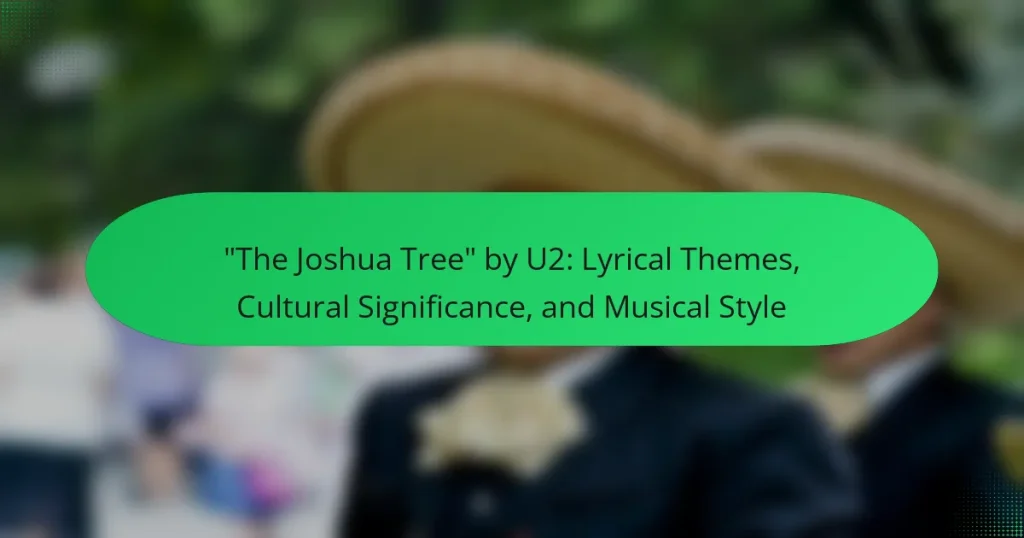“The Joshua Tree” is a studio album by the Irish rock band U2, released on March 9, 1987. The album explores themes related to social issues and American landscapes, characterized by its atmospheric sound influenced by rock, blues, and gospel music. Notable singles from the album include “With or Without You” and “I Still Haven’t Found What I’m Looking For.” “The Joshua Tree” achieved critical acclaim, winning the Grammy Award for Album of the Year in 1988, and has sold over 25 million copies globally, establishing U2’s prominence in the rock music scene. This article will examine the lyrical themes, cultural significance, and musical style of “The Joshua Tree.”

What is “The Joshua Tree” by U2?
“The Joshua Tree” is a studio album by the Irish rock band U2, released on March 9, 1987. This album features themes of [censured], social issues, and American landscapes. It is known for its atmospheric sound and influences from rock, blues, and gospel music. The album produced iconic singles like “With or Without You” and “I Still Haven’t Found What I’m Looking For.” “The Joshua Tree” received critical acclaim and won the Grammy Award for Album of the Year in 1988. It has sold over 25 million copies worldwide, solidifying U2’s status as a leading band in rock music. The album is often regarded as one of the greatest albums of all time.
How did “The Joshua Tree” come to be created?
“The Joshua Tree” was created by the Irish rock band U2 in 1987. The album emerged after their previous success with “The Unforgettable Fire.” U2 sought to explore themes of [censured] and social issues. They were influenced by their experiences in America, particularly the desert landscapes. The band collaborated with producer Daniel Lanois to achieve a distinct sound. Recording took place in various locations, including Windmill Lane Studios in Dublin. The album’s iconic cover featured a photograph of a Joshua tree in the Mojave Desert. “The Joshua Tree” received critical acclaim and commercial success, solidifying U2’s status in music history.
What were the influences behind the album’s production?
The influences behind the album’s production include American roots music and the political landscape of the 1980s. U2 sought to blend rock with folk and country elements. The band was inspired by their travels in the United States. They aimed to capture the essence of American culture and landscapes. Producer Daniel Lanois contributed significantly to the album’s atmospheric sound. The use of reverb and echo in production created a sense of vastness. Lyrically, the album reflects themes of [censured] and social justice. These influences shaped “The Joshua Tree” into a landmark album in rock history.
Who were the key collaborators involved in its making?
The key collaborators involved in the making of “The Joshua Tree” by U2 include producer Daniel Lanois and Brian Eno. Daniel Lanois played a significant role in shaping the album’s sound. He worked closely with the band during the recording process. Brian Eno contributed his expertise in ambient music and production techniques. Their collaboration helped create the album’s unique sonic landscape. U2’s members, Bono, The Edge, Adam Clayton, and Larry Mullen Jr., were also integral to the album’s development. Each member contributed their musical talents and artistic vision. This collaboration resulted in a critically acclaimed album that has had lasting cultural significance.
What are the main themes explored in “The Joshua Tree”?
The main themes explored in “The Joshua Tree” include [censured], social injustice, and the search for identity. [censured] is depicted through references to faith and transcendence. Social injustice is addressed through songs that highlight political and humanitarian issues. The search for identity is illustrated by personal and cultural reflections throughout the album. These themes resonate deeply within the context of the 1980s, reflecting the band’s experiences and observations. The album’s lyrics convey a sense of longing and exploration, making it a significant cultural artifact.
How do the lyrics reflect social and political issues?
The lyrics of “The Joshua Tree” by U2 reflect social and political issues through their themes of struggle, displacement, and hope. The song “Bullet the Blue Sky” addresses the impact of U.S. military intervention in Central America. It critiques the consequences of war and imperialism, highlighting the suffering of innocent civilians. “Running to Stand Still” portrays the struggles of addiction and poverty, emphasizing the human cost of societal neglect. The imagery in “Where the Streets Have No Name” advocates for equality and unity, challenging social divisions. U2 draws on personal and collective experiences to comment on broader societal injustices. These lyrics resonate with listeners by connecting personal narratives to larger political contexts.
What personal experiences of the band are captured in the songs?
The personal experiences of U2 captured in “The Joshua Tree” include themes of [censured], longing, and social issues. The band’s travels in America influenced their songwriting. Bono reflects on his personal struggles and search for meaning. The song “I Still Haven’t Found What I’m Looking For” expresses a quest for spiritual fulfillment. “Where the Streets Have No Name” addresses social inequality and the desire for unity. These experiences resonate with listeners, showcasing the band’s emotional depth. The album’s lyrics are rooted in real-life experiences and observations. U2’s journey through different cultures shapes their narrative. The songs serve as a reflection of their personal and collective journeys.
What is the cultural significance of “The Joshua Tree”?
“The Joshua Tree” by U2 holds significant cultural importance as it addresses themes of [censured], social justice, and American identity. The album reflects the band’s exploration of the American landscape and its complexities. Released in 1987, it resonated with listeners during a time of political turmoil and cultural change. The imagery of the Joshua tree symbolizes resilience and hope in harsh environments. Songs like “I Still Haven’t Found What I’m Looking For” express a quest for meaning and belonging. The album’s success helped elevate U2 to global prominence, influencing many artists and genres. It is often regarded as a landmark in rock music history, merging personal and political narratives. The Joshua Tree has inspired activism, particularly in human rights and environmental movements.
How has the album influenced other artists and genres?
“The Joshua Tree” by U2 has significantly influenced various artists and genres. The album’s blend of rock and Americana inspired countless musicians in the alternative and indie rock scenes. Artists like Coldplay and The Killers have cited U2’s expansive sound as a major influence on their music. The thematic depth of “The Joshua Tree” also encouraged artists to explore more introspective and socially conscious lyrics. Genres such as post-punk and folk rock have integrated elements from the album’s sound. Its success in the late 1980s set a precedent for blending rock with world music influences. The album’s production techniques have been emulated by numerous producers in contemporary music. Overall, its impact is evident in the evolution of various musical styles and the lyrical approach of subsequent artists.
What role does “The Joshua Tree” play in U2’s legacy?
“The Joshua Tree” is a cornerstone of U2’s legacy. Released in 1987, it solidified the band’s status as a global rock powerhouse. The album features themes of [censured], social justice, and American identity. It produced iconic hits like “With or Without You” and “I Still Haven’t Found What I’m Looking For.” “The Joshua Tree” won the Grammy Award for Album of the Year in 1988. Its critical acclaim and commercial success helped U2 transition from a post-punk band to mainstream icons. The album’s influence is evident in subsequent artists and genres. “The Joshua Tree” remains a defining work in rock music history.
How does the musical style of “The Joshua Tree” stand out?
The musical style of “The Joshua Tree” stands out due to its blend of rock, folk, and spiritual influences. U2 incorporated atmospheric soundscapes and layered guitar effects, creating a distinctive auditory experience. The album features anthemic melodies and introspective lyrics, reflecting themes of faith and social justice. Tracks like “Where the Streets Have No Name” showcase a unique build-up and expansive sound. The use of the Edge’s echoing guitar work adds to the album’s signature sound. Additionally, the incorporation of world music elements broadens its appeal. The production, led by Daniel Lanois and Brian Eno, enhances the album’s depth and texture. “The Joshua Tree” is often cited as a landmark in alternative rock, influencing numerous artists that followed.
What are the defining characteristics of the album’s sound?
The defining characteristics of “The Joshua Tree” album’s sound include a blend of rock, folk, and blues influences. The album features atmospheric guitar effects and expansive soundscapes. U2’s use of delay and reverb creates a sense of depth. The incorporation of traditional instruments adds a unique texture. Lyrically, the album explores themes of [censured] and social issues. The production quality is polished, contributing to its epic feel. The sound is characterized by anthemic choruses and emotive vocals. Overall, the album’s sound is both introspective and grand, resonating with listeners worldwide.
How do the musical elements enhance the lyrical themes?
Musical elements enhance lyrical themes by creating emotional depth and resonance. Instrumentation, such as the use of guitar effects, adds texture to the lyrics. For example, the echoing guitar in “Where the Streets Have No Name” amplifies themes of longing and escape. Rhythmic patterns establish a sense of urgency or tranquility, aligning with lyrical messages. The driving beat in “Bullet the Blue Sky” intensifies the urgency of its socio-political commentary. Harmonic choices, like modal shifts, evoke specific feelings that complement the lyrics. Overall, these musical elements work together to deepen the listener’s connection to the song’s themes.
What impact did “The Joshua Tree” have on the music industry?
“The Joshua Tree” significantly impacted the music industry by redefining the rock genre in the late 1980s. Released in 1987, it combined rock with influences from American roots music. The album’s success helped U2 achieve global superstardom. It sold over 25 million copies worldwide. The album’s themes of [censured] and political issues resonated with audiences. It inspired a wave of socially conscious rock music. Critics praised its production quality and lyrical depth. The album remains a benchmark for artistic ambition in rock music.
How did the album perform commercially and critically?
“The Joshua Tree” by U2 achieved significant commercial and critical success. The album debuted at number one on the US Billboard 200 chart. It sold over 25 million copies worldwide, making it one of the best-selling albums of all time. Critics praised its ambitious sound and lyrical depth. It received a Grammy Award for Album of the Year in 1988. The album is often cited in lists of the greatest albums ever made. Its themes resonated with audiences, addressing social and political issues. The album’s impact is evident in its lasting influence on rock music.
What awards and recognitions did “The Joshua Tree” receive?
“The Joshua Tree” by U2 received multiple prestigious awards and recognitions. It won the Grammy Award for Album of the Year in 1988. The album was also inducted into the Grammy Hall of Fame in 2007. Additionally, it was named Best Album of the Year by various publications, including Rolling Stone. The album is often regarded as one of the greatest albums of all time. Its cultural impact has led to numerous accolades over the years.
How can listeners appreciate “The Joshua Tree” more deeply?
Listeners can appreciate “The Joshua Tree” more deeply by exploring its lyrical themes and cultural significance. The album addresses issues such as [censured], social justice, and personal struggle. Understanding the historical context of the 1980s enhances appreciation. The political climate and U2’s activism during this time influenced the songs. Engaging with the music’s rich instrumentation adds another layer of depth. The use of echoing guitars and atmospheric sounds creates a unique auditory experience. Analyzing the album’s narrative structure reveals a journey through hope and despair. Listening to interviews with the band members provides insights into their creative process. This multifaceted approach fosters a more profound connection to the album.
What are some recommended listening tips for new fans?
New fans should start by listening to the album in its entirety. This allows them to appreciate the flow and progression of the songs. Focus on the lyrical themes present in each track. Understanding the context enhances the listening experience. Pay attention to the musical style, which blends rock with elements of folk and gospel. Listening with good quality headphones can improve sound clarity. Explore live performances to grasp the energy of the band. Reading about the album’s background can provide deeper insights. Engaging with fan communities can enrich their understanding and enjoyment.
How can understanding the context enhance the listening experience?
Understanding the context enhances the listening experience by providing deeper insight into the themes and emotions conveyed in the music. Context includes historical, cultural, and personal backgrounds related to the album. For “The Joshua Tree,” knowing its release during the 1980s aids in grasping its political and social commentary. The album reflects U2’s response to global issues, such as poverty and human rights. Familiarity with these contexts allows listeners to connect more profoundly with the lyrics and musical elements. This connection can evoke stronger emotional reactions and a greater appreciation for the artistry involved.
“The Joshua Tree” is a studio album by the Irish rock band U2, released on March 9, 1987, known for its exploration of themes such as [censured], social issues, and American landscapes. The article covers the album’s creation, key collaborators, and the influences that shaped its production, highlighting its cultural significance and impact on the music industry. It also examines the lyrical themes, personal experiences of the band, and the defining musical elements that contribute to its status as one of the greatest albums of all time. Additionally, the article discusses the commercial success and critical acclaim “The Joshua Tree” received, including awards and recognitions, while offering insights on how listeners can appreciate the album more deeply.


